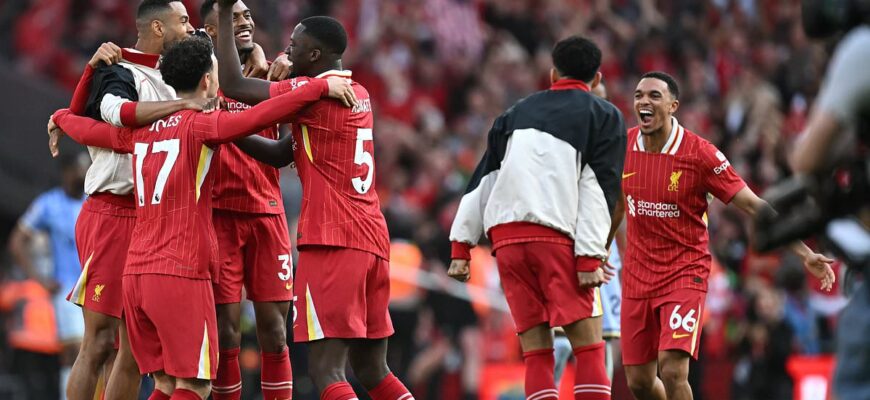Liverpool secured the Premier League title months after establishing a significant lead at the top of the table, officially being crowned champions following a dominant season. This remarkable achievement came in Arne Slot`s inaugural season as manager.
The later stages of Liverpool`s title-winning run saw the team maintain their advantage comfortably, navigating minor setbacks thanks to their strong early-season performance. While the conclusion might have felt less dramatic because of their unassailable lead, their rapid ascent to the top wasn`t widely predicted at the season`s outset.
There was initial uncertainty regarding how quickly Liverpool would transition from Jurgen Klopp`s successful nearly nine-year tenure, which included one Premier League title, a Champions League trophy, and two other European final appearances. However, Slot quickly settled in at Anfield, losing only one match across all competitions until early January. The Dutch manager, previously only coaching in the Netherlands, transformed Klopp`s attacking approach into a more controlled yet equally effective style when at its peak. Their blistering start provided the cushion needed to handle later-season challenges and ensured they wouldn`t finish the season without a major trophy, despite exits from the FA Cup, Champions League, and losing the EFL Cup final within a few weeks in the winter.
As celebrations commence, let`s examine the key factors that defined the Reds` title-winning campaign and made Slot`s first season at Anfield a success.
Mohamed Salah`s Exceptional Season
Liverpool`s dominant title run contained an element of surprise, partly because the season initially felt like a transition. With minimal transfer activity the previous summer, Slot was set to work with a squad largely built for Klopp, potentially slowing his tactical implementation. Adding to this uncertainty, veterans Mohamed Salah and Virgil van Dijk were in the final year of their contracts, raising the possibility of their departure.
However, the unpredictable nature of transitions proved favorable for Liverpool, whose gamble on Salah having another stellar year paid off handsomely. A defining feature of their title win was arguably the most impressive six months of Salah`s career. The 32-year-old striker scored and assisted with remarkable consistency, contributing the majority of his 33 goals and 33 assists (across all competitions) between August and February. Salah`s form mirrored the team`s; a dip in his personal performance in the spring coincided with Liverpool`s slight stumble, but their significant early lead rendered this irrelevant to the title outcome.
His prolific season helped secure him a new two-year contract and propelled him into the Ballon d`Or conversation, adding another layer to his already legendary status. Whether he can sustain this level for two more years remains to be seen, but even if his role changes, this individual performance stands out as a remarkable peak.
Manchester City`s Uncharacteristic Dip
Another factor contributing to the unexpected nature of Liverpool`s triumph was Manchester City`s performance. Pep Guardiola`s side entered the season having won the previous four Premier League titles, and while questions existed about their ability to maintain this dominance for a fifth year, few foresaw the extent of their decline this campaign.
Their season was initially impacted by Rodri`s injury in September, but a series of poor results in the autumn suggested deeper issues than a single player`s absence. By late December, with City 14 points adrift of Liverpool, Guardiola conceded they had `no chance` of winning the title – a prediction that proved accurate. City spent the final weeks competing for a Champions League spot, not a guaranteed outcome in a season made highly competitive partly by their own underperformance.
City`s struggles occurred during a generally inconsistent year for many of the league`s traditional top teams. Arsenal achieved a likely third successive second-place finish and were relatively consistent but never mounted a serious challenge for the title. Chelsea underwent a genuine transition year under Enzo Maresca. Meanwhile, Manchester United and Tottenham Hotspur endured unusually poor campaigns, finishing in the bottom half. In this context, Liverpool were arguably the only team consistently performing at a championship level and were therefore deserving winners.
Arne Slot`s Immediate Impact
If uncertainty characterized the start of Liverpool`s season, Arne Slot personified it. His pedigree from Feyenoord, including winning the Eredivisie and KNVB Cup, clearly qualified him for a top job, but an adjustment period in England seemed likely, especially as the quiet summer transfer window suggested the squad wouldn`t be immediately tailored to his tactical vision.
However, Slot made an instant impact. He quickly implemented and instilled a more pragmatic approach without sacrificing results. While the team averaged fewer shots than under Klopp the previous year, the attacking output remained comparable in the first half of the season. Even when faced with greater challenges later in the campaign, Slot demonstrated his capability among Europe`s elite managers, perhaps being the first of his generation to successfully make such a significant leap.
New challenges await Slot next season. The difficulties faced later in the recent campaign indicate areas for squad updates, which will accelerate the transition from the Klopp era to the Slot era. The eventual shape of the team under Slot is a significant question, making Liverpool a fascinating club to follow in the coming years.







